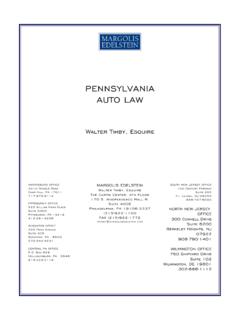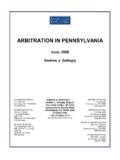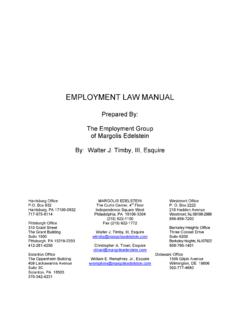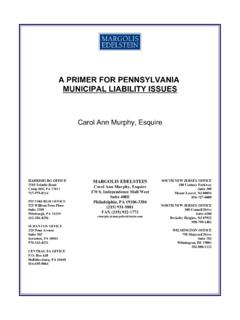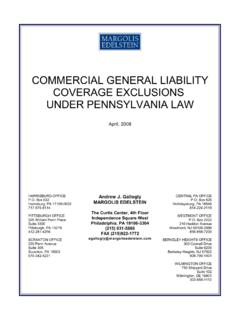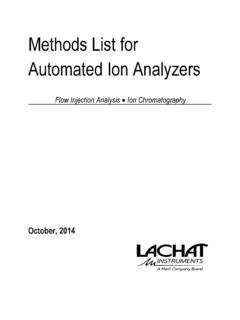Transcription of STATUTE OF REPOSE - Margolis Edelstein
1 STATUTE OF REPOSE . September, 2009. HARRISBURG OFFICE Margolis Edelstein CENTRAL PA OFFICE. Box 932 Box 628. Harrisburg, PA 17106-0932. 170 S. Independence Mall W Hollidaysburg, PA 16648. 717-975-8114 Suite 400E 814-224-2119. Philadelphia, PA 19106-3337. PITTSBURGH OFFICE (215) 922-1100 MT. LAUREL OFFICE. 525 William Penn Place 100 Century Parkway FAX (215) 922-1772. Suite 3300 Suite 200. Pittsburgh, PA 15219 Mt. Laurel, NJ 08054. 412-281-4256 856-727-6000. SCRANTON OFFICE BERKELEY HEIGHTS OFFICE. 220 Penn Avenue 300 Connel Drive Suite 305 Suite 6200. Scranton, PA 18503 Frederick T. Lachat, Jr. Berkeley Heights, NJ 07922. 570-342-4231 (215) 931-5850 908-790-1401. WESTERN PA OFFICE WILMINGTON OFFICE.
2 983 Third Street 750 Shipyard Drive Beaver, PA 15009 Suite 102. 724-774-6000 Wilmington, DE 19801. 302-888-1112. THE PENNSYLVANIA STATUTE OF REPOSE . Building contractors, engineers and design professionals frequently express concerns that they are at risk of being sued for work performed many years ago when a claim arises due to the condition of property over which they have no control. The Pennsylvania STATUTE of REPOSE affords some relief to builders, contractors, engineers and architects because the STATUTE provides a limitation on bringing civil action against any persons performing design, planning, supervision or observation of construction of improvements to real property within 12 years after completion of the construction of the improvement.
3 The STATUTE of REPOSE 42 Pa. 5536 provides as follows: [A]civil action or proceeding brought against any person lawfully performing or furnishing the design, planning, supervision or observation of construction, or construction of any improvement to real property must be commenced within 12. years after completion of construction of such improvement to recover damages for: (1) Any deficiency in the design, planning, supervision or observation of construction or construction of the improvement. **. (3) Injury to the person or for wrongful death arising out of any such deficiency. The STATUTE of REPOSE is intended to benefit engineers, architects, or contractors who were involved in the construction work, but the defense is not available to the owners or tenants who are in actual possession or control of the property.
4 42 Pa. 5536(b)(2). The STATUTE of REPOSE applies to claims for deficiencies in the design, planning, or construction of improvements to real property including claims for property damage. Claims for contribution and indemnity are likewise barred. The Pennsylvania STATUTE of REPOSE effectively eliminates the cause of action 12 years after the completion of construction of an improvement to real property, regardless of when an injury occurred. Vargo v. Koppers Co., 552 Pa. 371, 715. 423, (1998). Whether or not a particular object or structure is an improvement to real property is frequently the subject of dispute. For instance, the STATUTE of REPOSE was determined to apply to a manufacturer and seller of an industrial freezer who installed the unit in another company's manufacturing plant.
5 DeSantis v. Frick Company, 745 624 (Pa. Super 1999). The courts have also recognized that improvements to a highway are an improvement to real property, and thus claims against the engineer or construction contractor for the highway could be barred under the STATUTE of REPOSE . Keller v. Commonwealth Department of Transportation, 424 614. (Pa. Commw. 1981). By comparison, it has been held that the diving blocks for a swimming pool, even though affixed to the real property, were not improvements to real estate. Noll by Noll v. Harrisburg Area YMCA, 537 Pa. 274, 643 81 (1994). Manufacturers who supply a defective product which is later incorporated into the improvement of real property are not in the class protected by the STATUTE of REPOSE .
6 McConnaughey v. Building Components, 536 Pa. 95, 637 1331 (1994), Ferricks v. Ryan Homes, Inc., 578 441. (Pa. Super. 1991). In the Ferricks case, it was held that the manufacturer of building material such as plywood used as a component in construction of the actual improvement would not come within the definition of improvement within the meaning of the STATUTE of REPOSE . The Noll case, mentioned above, contains probably the best description of what constitutes an improvement to real property. The Supreme Court of Pennsylvania described an improvement as a valuable addition to property (usually real estate) or an amelioration in its condition, amounting to more than mere repairs or replacement, costing labor or capital, and intended to enhance its value, duty or utility or to adapt it for new further purposes.
7 An improvement includes everything that permanently enhances the value of real property. As an example, improvements include the erection of a building, replacement of old buildings with new ones, substantial repairs to a building necessary to preserve a building, the making of substantial additions or changes in existing buildings, construction of sidewalks, erection of fences, and the preparation of land for building site. The courts have recognized that the most problematic area is dealing with a chattel or personalty which is attached to real property. Radvin v. General Electric Company, 576 396 (Pa. Super. 1990). The courts have held that a fixture is by definition an improvement to real property.
8 The general test used in determining when an article or personalty is a fixture has three components: (1) the relative permanence of attachment to realty; (2) the extent to which the chattel is necessary or essential to the use of the realty; and (3) the intention of the parties to make a permanent addition to realty. In the Noll case, the Supreme Court held that whether an object is a fixture must be determined by the court, and the factors to be determined include the degree to which, and the manner in which, the object is attached to the real property; the ease of removing the object;. whether the object may be removed without damaging the real property; how long the object has been attached to the real property; whether the object is necessary or essential to the real property; and the conduct of the party and whether it evidences an intent to permanently attach the object to realty.
9 In the Noll case, the court concluded that the diving platforms were not an improvement to real property because they were removable and attached to the pool by bolts. Most improvements to property are clearly understood as such; however, disputes frequently arise in a commercial or industrial setting when large pre-manufactured products are installed. The manufactures and sellers of such products can be afforded protection under the STATUTE of REPOSE ; however, such products need to fall within the description of permanently installed fixtures as described in the holdings of the Supreme Court. For more information on the STATUTE of REPOSE , or any other aspect of Margolis Edelstein 's construction practice, please contact Frederick T.
10 Lachat, Jr. Frederick T. Lachat, Jr. Margolis Edelstein 170 S. Independence Mall West Suite 400E. Philadelphia, PA 19106-3337. 215-931-5850. (Fax) 215-922-1100. Any information contained in, or linked to our Web site is not intended to convey legal advice. There is absolutely no substitute for a thorough consultation with a qualified attorney as to your specific fact situation.
